
ABC Carnival '74
Across the Board
Baloney
Bamboozle
Be What You Want
Beat The Genius
Beat The Odds (1962)
Beat The Odds (1975)
Bedtime Stories
The Better Sex
The Big Money
The Big Payoff
Big Spenders
Blank Check
Body Language
Body Talk
The Buck Stops Here
Bullseye
Call My Bluff
Card Sharks (1996)
Casino
Caught in the Act
Celebrity Billiards
Celebrity Doubletalk
Celebrity Secrets
Celebrity Sweepstakes
Chain Letter (1964)
The Challengers (1974)
Change Partners
Child's Play
The Choice Is Yours
Combination Lock (1996)
Comedy Club
Concentration (1985)
The Confidence Game
Cop Out
Countdown (1974)
Countdown (1990)
The Couples Race
Crossword
Decisions, Decisions
Dollar a Second
Duel in the Daytime
The Fashion Show
Fast Friends
$50,000 a Minute
Finish Line (1975)
Finish Line (1990)
Get Rich Quick
Going, Going, Gone!
Head of the Class
High Rollers
Hollywood Squares (1965)
Hollywood Squares (1985)
The Honeymoon Game
Hot Numbers
Hot Potato
House to House
How Do You Like Your Eggs?
Jackpot (1984)
Jeopardy (1977)
Jokers Wild
Jumble
Key Witness
Keynotes (1986)
King of the Hill
Let's Make a Deal (1963)
Let's Make a Deal (1990)
The Love Experts
M'ama Non M'ama
Match Game (1962)
Match Game (1973)
Match Game (1990)
Match Game (1996)
MatchGame (2008)
Mindreaders
Missing Links
Monday Night QB
Money Words
Money in the Blank
Moneymaze
Monopoly (1987)
Nothing But the Truth
Now You See It (1986)
Oddball
100%
PDQ
Party Line
People On TV
Play For Keeps
Play Your Hunch
The Plot Thickens
Pot O' Gold
Pressure Point
The Price Is Right (1972)
Pyramid (1996)
Pyramid (1997)
A Question of Scruples
Quick as a Flash
Razzle Dazzle
Riddlers
Run For The Money
Says Who?
Scrabble (1990)
Second Guessers
Second Honeymoon
Sharaize
Shoot for the Stars
Shoot the Works
Shopping Spree
Show Me
Showoffs
Simon Says
$64,000 Question (2000)
Smart Alecks
Smart Money
Spellbinders
Spin-Off
Split Decision
Star Cluster
Star Play
Strictly Confidential
TKO
Talking Pictures (1968)
Talking Pictures (1976)
Tell It to Groucho
Temptation (1981)
$10,000 Sweep
Three of a Kind
Tic Tac Dough
Tie-Up
Top Secret
Twenty One (1982)
Twenty Questions
Twisters
Up and Over
The Waiting Game
We've Got Your Number
What Do You Want?
What's On Your Mind
Wheel of Fortune
Whew!
Whodunit
Whose Baby
Wipeout
Word Grabbers
Write Your Own Ticket
You Bet Your Life (1988)
You Bet Your Life (1991)
You're Putting Me On
Show a Random Pilot
Show Unreviewed Pilots
Bob Stewart Flow Chart
Match Game (1973)
Producer: Goodson-Todman
Host: Gene Rayburn
Announcer: Johnny Olson
Celebrities: Bert Convy, Arlene Francis, Jack Klugman, Jo Anne Pflug, Richard Dawson, Betty White
Taping Info: May 19, 1973 at CBS in Los Angeles
Made it to Air: Yes. This version joined the CBS lineup on July 2, 1973, replacing The Vin Scully Show. It remained on CBS until 1979 when it was replaced by Whew!. It then moved to first-run syndication until 1982. There was a successful airing before this version from 1962-1969 and after in 1990-91 and 1998-99.
Availability: The first pilot is available on the trading circuit. The second pilot, which was shot immediately after the first one, is not.
The original Match Game, which featured two celebrities and four contestants, had an incredibly stable run throughout most of the 1960s on NBC, becoming a hit with those home from school since it aired at 4 PM in the East. Many game shows hit the cancellation skids in the late 1960s and Match Game was no exception. In 1971, ABC picked up a revival of Password that was pretty indistinguishable from the original. However, when The Price is Right hit the air in 1972, Mark Goodson heavily revamped the show, changing it from a simple price guessing game to a carnival of glitz and bonus games.
So, when CBS was interested in bringing back Match Game in 1973, Goodson could have gone one of two ways. He could have gone the safe Password route or the risky Price is Right route. He chose the latter, and the game became a new classic. Since most everyone is very familiar with how the 70s version worked, this page is going to reflect on how a viewer would have compared this to the 60s version.
Unlike the original version, the contestants and celebrities are not mixed together. The contestants still are on the left, but the celebrities have moved to the right in a two-tiered setup to handle the now six celebrities. Gene Rayburn, the host of the original, is still around, but lost his little bunker that he had on the right side. Instead, he's now free to roam, constantly going back between the contestant and celebrity areas.
Also unlike the original, each question is only for one of the contestants, not both. A contestant is asked a question, such as "John's daughter came home from a college with a _." A brief musical interlude plays while the celebrities write their answers, and when they're ready (indicated by their nameplate lighted). The contestant says his or her answer, and then attempts to match as many celebrities as they can, with the player getting one point per match. After this, the other contestant gets his or her question and the round is completed. In the second round, the player tries to match only the celebrities they failed to match in the first, making the maximum possible score six.
The winner of the game received $100 and goes on to play "Jackpot Match" for $100, $250 or $500. A word phrase is given such as "_ pie", and the contestant asks three celebrities for ideas, and then decides on one of them. If his or her selection was the most popular selection according to a poll of a previous audience, the player received $500, the second most popular $250, and the final $100. Then, the player picked one celebrity and they played in a "head-to-head" match in an attempt to win ten times they had just won. A winning player then returned to take on a new opponent.
The differences between this pilot and what eventually became Match Game '73 were mostly cosmetic. For one, there was no "73" in the title. The triangles were blue instead of green and the podium was laid out and shaped differently. The celebrity's triangle or circle stayed lit until they matched, and which point it became dark, opposite of the series. The bonus game was called "Jackpot Match" instead of "Super Match". The phrase in the head-to-head match was given to the player before they were required to select a celebrity. There was also no buzzer sound effect for an incorrect match.
It is a common misconception that the 60s version had incredibly pedestrian questions and the 70s immediately went to a double entendre fest. I've seen an episode from 1964, 1969 and pretty much the entire run of the 1970s. The questions in 1969 were closer to the 1973 version than the 1964 version. Even then, the questions were starting to get a little titillating, and this pilot and the first few months of the 1973 episodes were not that different, including some of the non-fill-in-the-blank variety (e.g. "Name something a baby does more than an adult"), although the second pilot may not have hit the circuit due to a contestant answer of 'fag'. This pilot was not a good indicator of the monster hit the show would become. Also, I never understood why you only got to match a celebrity *once*.
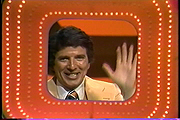 It's Bert Convy... |
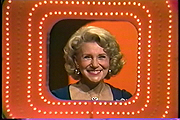 and Arlene Francis... |
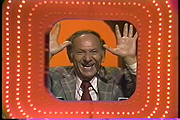 and Jack Klugman... |
|
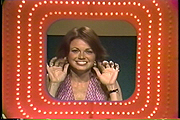 plus Jo Anne Pflug... |
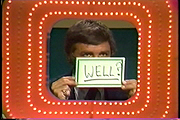 and Richard Dawson... |
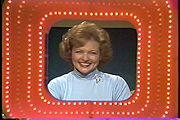 and finally Betty White |
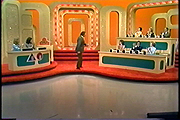 all here to play Match Game |
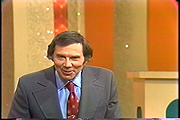 Here is our wacky host Gene Rayburn |
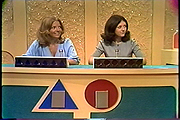 Here are the contestants |
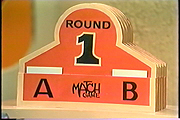 You can choose your question |
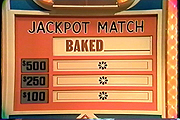 And you can win $5,000 in the Jackpot Match |
This pilot has been viewed 20719 times since October 6, 2008 and was last modified on Dec 12, 2009 14:46 ET
Feedback? Contact me at usgs-pilot at the usgameshows dot net domain